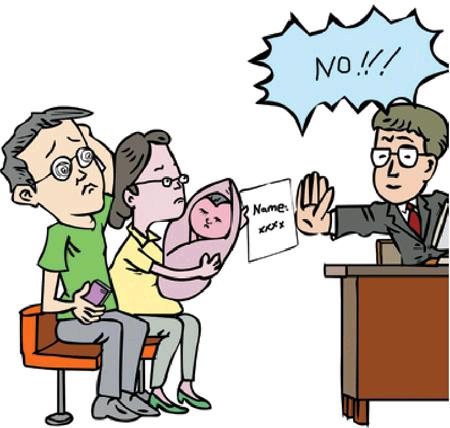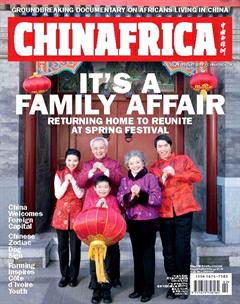Should There Be Legal Restrictions on Children’s Names?
A recent spate of controversial names have steered public debate toward peoples rights when naming their children. In late 2017, the story of a newborn girl in Xian named “Wang Zherongyao,” or King of Glory, after a popular online game, went viral. The babys name was later registered at the local household registration authority. In southwest Chinas Chongqing Municipality, a girl named“Huang Pujunxiao,” or Whampoa Military Academy, the first modern military school in China, also gained fleeting fame online. The girls father told the media that he named his daughter so because he hoped she would become a soldier.
The most extreme case was in 2009, when a baby named “Beiyan Yunyi” (loosely translated as north-bound wild goose in the clouds) was denied household registration by the local residence authorities in Jinan, north Chinas Shandong Province, on the grounds that the baby did not inherit the family name.
In December that year, the father, Lu Xiaofeng, subsequently filed a lawsuit with the Primary Peoples Court of Lixia District of Jinan on behalf of his daughter, claiming that there should be no interference in her name. It was the countrys first administrative case related to the right to choose a family name. Later, the court cited the Marriage Law and rejected the appeal of“Beiyan Yunyi” to be registered.
According to the Marriage Law, a person should be named after his or her parents. Exceptions include circumstances where one is named after another immediate family member or an adoptive parent, or when a surname other than that of ones parents is used for a “justifiable reason which is not against social and cultural customs.”
These cases have caused great debate in China. Some people believe that there should be legal restrictions on giving childrens names as an unorthodox name may bring unexpected inconvenience to a child in the future, while others hold that the parents should have the rights to independently naming their children.
ZhAnG PEIYUAn Jiaxing Daily It is with names that parents pin their great hopes and aspirations for the future onto their children. Since ancient times, the Chinese have been very serious about the naming of their offspring. Names that are easy to read, sound good and have a positive meaning are always good choices.
However, recent years have seen an increase in unorthodox names. Some parents seem to behave capricio usly in the naming of their children, with some so bizarre that even school teachers have to first consult a dictionary before daring to pronounce them, and local police stations in some cases refusing to register them. Names are labels for people, but they are also a significant gift from parents to their children. A strange name might blight a child for his or her whole lifetime. If parents really mean well and want a good future for their children, why do they choose to name them in a weird way?
Citizens do enjoy the legal right to name their children, but this right is not unconditional. Children do not belong to their parents. Its improper to cause trouble to the whole society just because of parents personal preference for a particular unusual name. When individual freedom runs counter to public interests, laws are in place to first protect the public. In my opinion, the law needs to strike a balance between protecting peoples personal freedom and the public interest of society.
ZhU YOnGhUA Hunan Daily In accordance with the principle that the absence of legal prohibition means freedom, the name “Beiyan Yunyi”should be permitted. However, the name was rejected for household registration after the relevant authorities cited the Marriage Law as their reason. Actually, in this case, neither side is persuasive enough.
Parents do have the freedom and right to select names for their children, but this freedom is limited within certain legal boundaries, which means parents should refrain from being too whimsical when choosing names. Apart from the involved government departments, Internet users also expressed their opposition to Lus choice for his daughters name. They accused him of being too unprincipled, lacking respect for traditional culture and potentially creating problems for his daughter in the future.
Several years ago, the name“Beiyan Yunyi” was rejected by local authority for household registration on the grounds that it defied traditional culture and undermined effective social management. If Lu can try to understand the problem from this perspective, I think he is less likely to complain about the courts verdict.
JIAnG MEnG www.people.com.cn In China, peoples names usually reflect the historical trends of the time when they received that name. For example, many of those who were born in the 1950s and 1960s were given names with contemporary meanings, such as “Jianguo”(building nation) and “Aihua”(loving China).
These were regarded as good positive names, and are a reflection of what society considered valuable and important at that time. However, these names are considered outdated nowadays. Confusion would often arise because so many people shared the same names. Even so, people did not rush to change their names, since names are vessels of historic memory and once a person gets used to a name, the names function as a label is more important than anything else.
Today, some young parents like to use strange, even bizarre names for their children. This is but a reflection of this era, where people are eager to show their personality, to attract others attention and to pursue individual freedom. Such an attitude should not necessarily be criticized.
Nowadays, people tend to be more open-minded than in the past; so they wont be surprised by a name like this. Thus, there should be no fixed criteria on names. As long as they are not actually in breach of ethics and meet the standards of Chinese characters, we should show tolerance toward them.
GU JInhAO www.nen.com.cn Why was the name “Beiyan Yunyi” rejected to be registered? The official explanation is that the child did not have a surname of her parent, or an immediate family member without any valid alternative justification. Simply put, it means that “Beiyan Yunyi,”as a persons name, contravenes the Marriage Law and the General Provisions of the Civil Law.
However, this explanation seems contradictory. On the one hand, the laws grant citizens naming rights where they are appropriate, permitting parents to name their children; but on the other hand, impose judicial restrictions on these rights. More importantly, the definition of “appropriate” here is vague. In my opinion, if the parents think the name is “appropriate,” it is appropriate.
The current dispute on name rights reveals deficiencies in the current law, which not only confuses the public, but also affects the publics personal freedom and interests. ca

